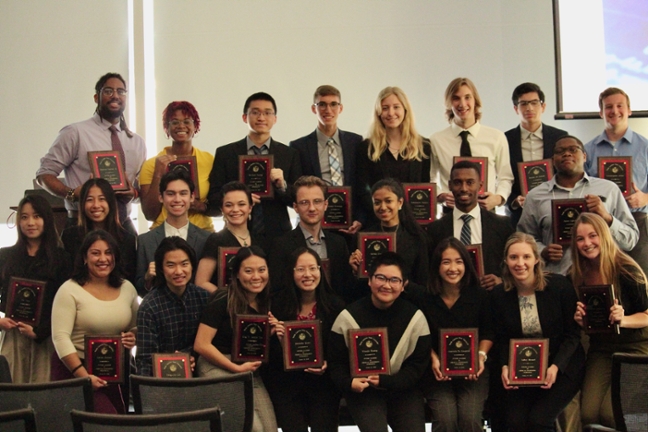Miami University senior Jasmine Tran attends Future Leaders in Chemical Science award symposium for undergraduate researchers
Miami University senior Jasmine Tran recently attended the Future Leaders in Chemical Science award symposium and presented her research on predicting physical properties.
Miami University senior Jasmine Tran attends Future Leaders in Chemical Science award symposium for undergraduate researchers
By Gabby Benedict, CEC Student Intern
Jasmine Tran is a senior double majoring in Chemical Engineering and Media and Communications who recently attended the Future Leaders in Chemical Science award symposium. She presented her research on predicting partition coefficients by using solvation models.
Future Leaders in Chemical Engineering is a national award symposium for undergraduate researchers and is organized by the Department of Chemical and Biomolecular Engineering at North Carolina (NC) State University in Raleigh, NC. The research symposium is highly selective and a small group of undergraduate students in the United States are chosen to present their work and be recognized for their achievements. In addition, students get to show their potential as future leaders in chemical and biomolecular engineering.
Tran’s presentation was titled “Predicting Octanol/Water Partition Coefficients for the SAMPL7 Challenge Using SM12, SM8, and SMD Solvation Models” and she, along with the other 24 awardees, presented in the form of 2-minute “soundbites” and a poster session.
Tran applied to the program after mentor Andrew Paluch, an associate professor in Miami’s Chemical, Paper and Biomedical Engineering department, recommended it. Not only did Tran get to present and receive recognition for her work, but also had the opportunity to network with faculty and peers at NC State and learn about their graduate program.

Tran had previously struggled with studying during the COVID-19 pandemic and had to go to virtual classes with a 12-hour difference between her hometown in Vietnam and the university, but Paluch’s accommodations helped her tremendously at the time.
“Even though I was, like, halfway across the world, I was still doing research with him and he had created an opportunity for me to be part of the team. He is a wonderful mentor and would meet with me at 7 PM just to catch up with me and my research process,” Tran said.
In the future, Tran hopes to continue researching new solutions to creating clean water and predicting water partition coefficients, which could eventually lead to creating clean water resources and making them more universally accessible to communities who aren’t able to access or afford it.
“In my hometown, there were days where the water got really salty because of the ocean water rising and getting into the river where people got their water. It’s been really severe with the saline water and could also affect agriculture and such, which is why I’m interested in creating a project that’s not only high-tech, but also affordable to people,” Tran said.